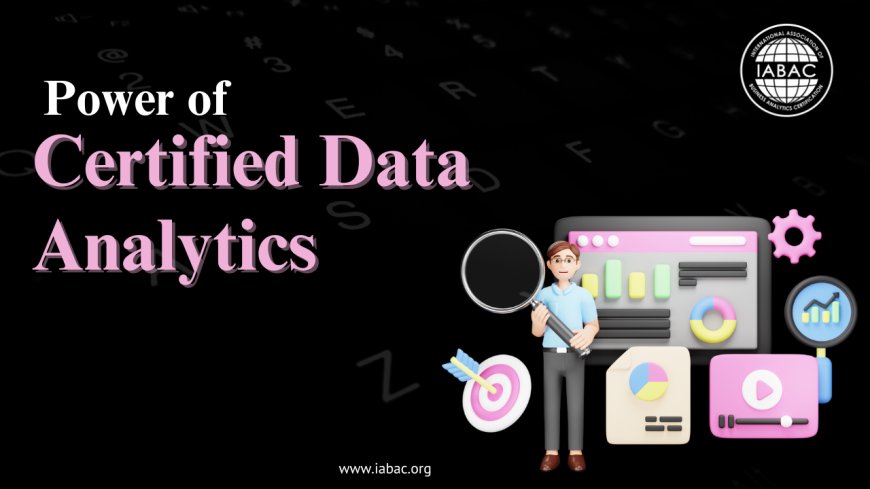The Power of Certified Data Analytics
Discover the impact of certified data analytics. Learn how certified skills enhance decision-making and drive business success.

Data analytics is the process of looking closely at large sets of data to find patterns, relationships, and useful information. In today's world where data is everywhere, businesses use data analytics to make better decisions, improve their operations, and offer better customer service. As technology and data continue to grow, the role of data analytics in business is becoming more crucial. Companies that use data analytics well can spot trends faster and adapt their strategies accordingly, giving them an edge over competitors.
"Certified data analytics" means that someone has proven their skills in data analytics through formal training and testing, earning a certificate from a recognized institution or organization. This certification is important because it shows that the person has a certain level of knowledge and skills. For businesses, hiring someone with a certification means they're getting a professional who meets a high standard. For individuals, getting certified can help improve their job prospects and keep them up to date with the latest in the field. Certifications also build trust, as clients and employers see them as a mark of quality and commitment.
What is Data Analytics?
Data analytics is the study of raw data. It’s used to discover patterns and solve problems through analysis. It's quite broad and is used in many areas like business, healthcare, and more. Analysts use tools to sift through data and find what's important.
Role of Data Analytics in Various Industries
Different sectors use data analytics to improve their operations:
-
Business: Companies analyze data to understand what customers want, see buying trends, and streamline how they work.
-
Healthcare: Hospitals and clinics analyze data to predict patient trends, manage staff, and find better ways to treat people.
-
Finance: Banks and insurers use data to assess risks, detect fraud, and keep customers happy.
-
Retail: Stores use data to manage stock, plan sales, and tailor promotions to what customers like.
Importance of Accuracy and Reliability in Data Analysis
In data analysis, being accurate (right) and reliable (consistent) is crucial:
-
Accuracy: This means the conclusions drawn from data analysis need to be correct. If the analysis is accurate, decisions based on it are more likely to be right.
-
Reliability: This means getting the same results from the same data every time. Reliable data helps build trust in the findings.
Having accurate and reliable data analysis is important because it helps businesses and other sectors make well-informed decisions. It ensures that they use their resources wisely and make choices that are likely to lead to success.
The Need for Certification in Data Analytics
Explanation of Certification and Its Significance
Certification in data analytics is a formal recognition awarded to individuals who complete specific courses and pass exams in the field of data analytics. It is significant because it acts as a stamp of approval on a person's skills, showing they have met an established standard of knowledge and proficiency.
Benefits of Being Certified
-
Credibility: Having a certification makes a professional more credible. It shows that a reliable and recognized institution has endorsed their skills, which can reassure employers and clients of their capabilities.
-
Skill Validation: Certification serves as a formal validation of an individual’s technical abilities and understanding of data analytics. It proves that the person has the necessary knowledge and skills to handle data analysis tasks effectively.
-
Career Advancement: Being certified can open up more job opportunities and potentially lead to higher positions within a company. It makes a resume more attractive and can help a professional stand out in the job market.
Popular Data Analytics Certification Programs
-
Google Data Analytics Certificate: This program is designed to teach beginners the essentials of data analytics, including data processing and visualization. It’s well-suited for those starting their careers and looking to gain practical skills quickly.
-
SAS Certified Data Scientist: This certification is aimed at more advanced users who want to demonstrate deep knowledge in using SAS for data manipulation, statistical analysis, and predictive modeling.
-
Microsoft Certified: Data Analyst Associate: This program focuses on teaching individuals how to leverage Microsoft Excel, Power BI, and SQL Server to extract insights from data. It’s ideal for those who want to specialize in Microsoft tools and technologies for data analysis.
Advantages of Certified Data Analytics Professionals
Enhanced Knowledge and Skills:
Content of Certification Programs: These programs cover a wide range of topics essential for effective data analysis. This includes data collection, cleaning, analysis, and visualization techniques. Participants learn how to use various tools and software that are industry standards, helping them handle real-world data problems efficiently.
Increased Job Opportunities and Higher Earning Potential:
-
Job Opportunities: Certified professionals often have access to more job openings. Companies frequently seek out certified individuals for their proven expertise, making it easier for these professionals to find employment.
-
Earning Potential: With certification, individuals are more likely to qualify for higher-paying roles. Their formal recognition as knowledgeable and skilled professionals can lead to better salary offers compared to non-certified counterparts.
Impact on Businesses and Organizations
Driving Business Growth and Efficiency:
-
Enhancing Efficiency: Certified data analysts can optimize processes by identifying inefficiencies through data examination. This might involve streamlining operations, reducing waste, or enhancing productivity, all of which contribute to better overall efficiency in the workplace.
-
Supporting Growth: By uncovering trends and patterns from data, certified analysts help businesses understand market dynamics, customer preferences, and potential new markets. This information can guide strategic investments and innovation initiatives that drive growth.
Real-World Examples of Benefits of Employing Certified Data Analysts:
-
Retail Sector: A major retail chain employed certified data analysts to optimize their inventory levels across stores. The analysts used data to predict customer buying patterns, leading to a reduction in overstock and stockouts, ultimately improving profitability.
-
Healthcare Industry: A healthcare provider uses data analysts to improve patient care. By analyzing patient data, analysts identified trends that led to better disease management programs and treatment plans, enhancing patient outcomes and reducing costs.
Role in Decision-Making and Strategic Planning:
-
Informed Decision-Making: Certified data analysts provide insights that are crucial for making informed decisions. They convert complex data sets into understandable reports and dashboards, helping management see the bigger picture and make choices based on data.
-
Strategic Planning: These analysts play a key role in shaping the strategic direction of a company. By forecasting future trends and evaluating the potential impact of different business strategies, they help leaders plan actions that align with long-term objectives.
Data analytics is a field that keeps evolving with new technologies and trends. Here's a look at some of the latest developments and what they might mean for professionals in the field:
Emerging Trends and Technologies in Data Analytics
Data analytics is constantly benefiting from new technologies that make analyzing large amounts of data easier and more efficient. Some of the emerging trends include:
-
Artificial Intelligence and Machine Learning: These technologies are making it possible to automate complex data analysis tasks, which can help in making faster and more accurate predictions.
-
Big Data Technologies: With more data available than ever, technologies that can handle large volumes of data at high speeds are becoming crucial.
-
Cloud Computing: Using the cloud allows data analysts to work with large datasets without needing powerful computers on-site, as they can access computing power through the internet.
-
Data Visualization Tools: New tools are making it easier to visualize data in clear and impactful ways, helping to communicate findings more effectively.
The Evolving Landscape of Certification Programs
As the field of data analytics grows, so does the range of certification programs available. These programs are evolving to include the latest technologies and skills needed by today's data analysts. Certifications can now be found in:
-
Specialized Analytics Techniques: Programs focusing on specific techniques like predictive analytics, data mining, or statistical analysis.
-
Tool-Specific Certifications: Certifications that teach proficiency in popular data analytics tools like Python, R, SAS, or specific platforms like AWS or Google Cloud.
-
Industry-Specific Analytics: Certifications tailored to the needs of specific industries like healthcare, finance, or marketing analytics.
Future Demand for Certified Data Analysts
The demand for skilled data analysts is expected to continue growing. As businesses and organizations rely more on data-driven decision-making, the need for professionals who can interpret and analyze data effectively will increase. Here are a few reasons why:
-
Increasing Data Availability: As more devices become connected to the internet and businesses continue to digitize, the amount of data generated will grow, increasing the need for data analysis.
-
Decision Making: Companies rely on data to make informed decisions. Skilled analysts who can provide insights from the data are crucial.
-
Competitive Advantage: Organizations use data analytics to gain insights that can provide a competitive edge in their industry.
Becoming a certified data analyst can help professionals prove their skills and knowledge in the field, making them more attractive to employers who need these capabilities to leverage data effectively.
Data analytics certification is vital because it equips professionals with the skills and knowledge needed to interpret and analyze data effectively, providing organizations with valuable insights that drive informed decision-making and competitive advantages. Pursuing certification not only boosts career growth but also contributes significantly to organizational success. As the field of data analytics continues to evolve with new technologies and methodologies, the role of certified professionals becomes increasingly crucial in navigating this dynamic landscape and leading the way in data-driven strategies.











































